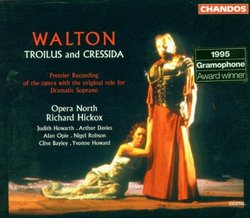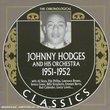| All Artists: William Walton, Richard Hickox, Alan Opie, Arthur Davies, Brian Cookson, Yvonne Howard, Judith Howarth, James Thornton, Keith Mills, Nigel Robson Clive Bayley, David Owen-Lewis, Stephen Dowson Peter Bodenham Title: Walton: Troilus and Cressida Members Wishing: 0 Total Copies: 0 Label: Chandos Release Date: 5/23/1995 Album Type: Box set Genre: Classical Style: Opera & Classical Vocal Number of Discs: 2 SwapaCD Credits: 2 UPC: 095115937020 |
Search - William Walton, Richard Hickox, Alan Opie :: Walton: Troilus and Cressida
 | William Walton, Richard Hickox, Alan Opie Walton: Troilus and Cressida Genre: Classical
|
Larger Image |
CD DetailsSimilar CDs
|
CD Reviews'The harm is don, and fare-wel faldefare!' DAVID BRYSON | Glossop Derbyshire England | 11/08/2004 (4 out of 5 stars) "The problem with Walton's Troilus and Cressida is Christopher Hassall's libretto. This may not be entirely Hassall's fault, as Walton himself and the usual quota of busybodies had an involvement in it. The idea of the opera was conceived in the immediate post-war period, and neither scribe nor composer had any previous experience in this particular area. Moreover it is probably a bit unreasonable - up to a point - to complain that the style of writing verges on the ludicrous in a post-war context when the war was not long over, but I simply can't swallow it all the same. If you were a contestant on Quote/Unquote or some such programme and asked to place the lines `Child of the wine-dark wave/Mantled in beauty,/Spirit of Immortal love' who would you guess? Elizabeth Barratt Browning, maybe? Christina Rosetti? Lady Walton in her preface gives us only a certain amount of insight into the turmoil there was over this libretto, but when she lets slip that Walton himself flung out the insult `Ivor Novello' it's easy to believe her. And there is worse to come, e.g. `Come forth a Queen/And nevermore be seen/In base captivity'. The Rev Thomas Morell turned out that sort of lingo for Handel, however it was at the least the standard poetic idiom of their time, and more importantly Morell had a sound instinct for a musico-dramatic plot-line. What Hassall has done, or allowed others to make him do, in that particular respect is a crying shame.
Troilus and Cressida is one of Shakespeare's weaker plays whereas Chaucer's Troilus and Criseyde is one of the greatest things in English literature. However it's all too easy to imagine that novices did not feel up to using it as their basis. Hoffmansthal and Strauss might have found it right up their street if they had been looking that way, but what fills me with regret is that I feel that Walton might have been up to it as well. What they all settled for among them was the wrong kind of `Let's Make an Opera'. Basing themselves roughly on Shakespeare they sweep aside all Chaucer's subtlety, clarity and diabolical originality in the characterisation. Cressida and Troilus become an assembly-line operatic soprano and tenor in reach-me-down operatic situations. Diomede is well contrasted with Troilus I suppose, but in an obvious operatic sort of way. Chaucer's contrast is every bit as simple but in a completely devastating way - Diomede does not have to be portrayed as the kind of Hollywood-standard Greek hero he is here (indeed Chaucer calls him `square'), just self-confident with women in wince-making contradistinction from the tongue-tied Troilus. Something survives of Chaucer's strange Pandarus, but only enough to make me feel all the more keenly the contrast between Chaucer's unique inspiration and the feeble shadow of a parish-magazine odester that Hassall manages to seem by comparison. How this affects the music seems to me to be this way - Walton had an acute sense of the theatrical, as we can hear in, say, his incidental music for Hamlet. Everything is basically right in his scoring here too. It is never stodgy and always resourceful, and he is blessedly light-footed, keeping things moving and avoiding a Wagnerian andante. What can also happen with Walton's theatre-music is that he is prone to overdoing brief effects, such as the ghost in Hamlet. In Troilus and Cressida he has been left with a smoothed-out-average operatic plot lacking any real distinctiveness in the characters or their interaction. Incidents such as the moonlight flit done by Calkas (so spelled) and the prisoner exchange thus come to be significant dramatic incidents in a way they were not for Chaucer in pursuit of his psycho-drama, and either Walton overplays them or maybe he just had no option about that. There is any amount of fine music here, notably in the early stages of Act III, and that is what fills me with the unsatisfied sense that given a more adult challenge he might have made something really distinctive and unforgettable out of it. It would not be fair to give this fine performance less than 4 stars because the executants and technicians handle it very well indeed whatever my disappointments with the work itself. I love Walton and I love Chaucer and it may be that you will find, as I do, that the intrinsic interest and beauty of the music goes a long way to bringing them closer together." |

 Track Listings (19) - Disc #1
Track Listings (19) - Disc #1
